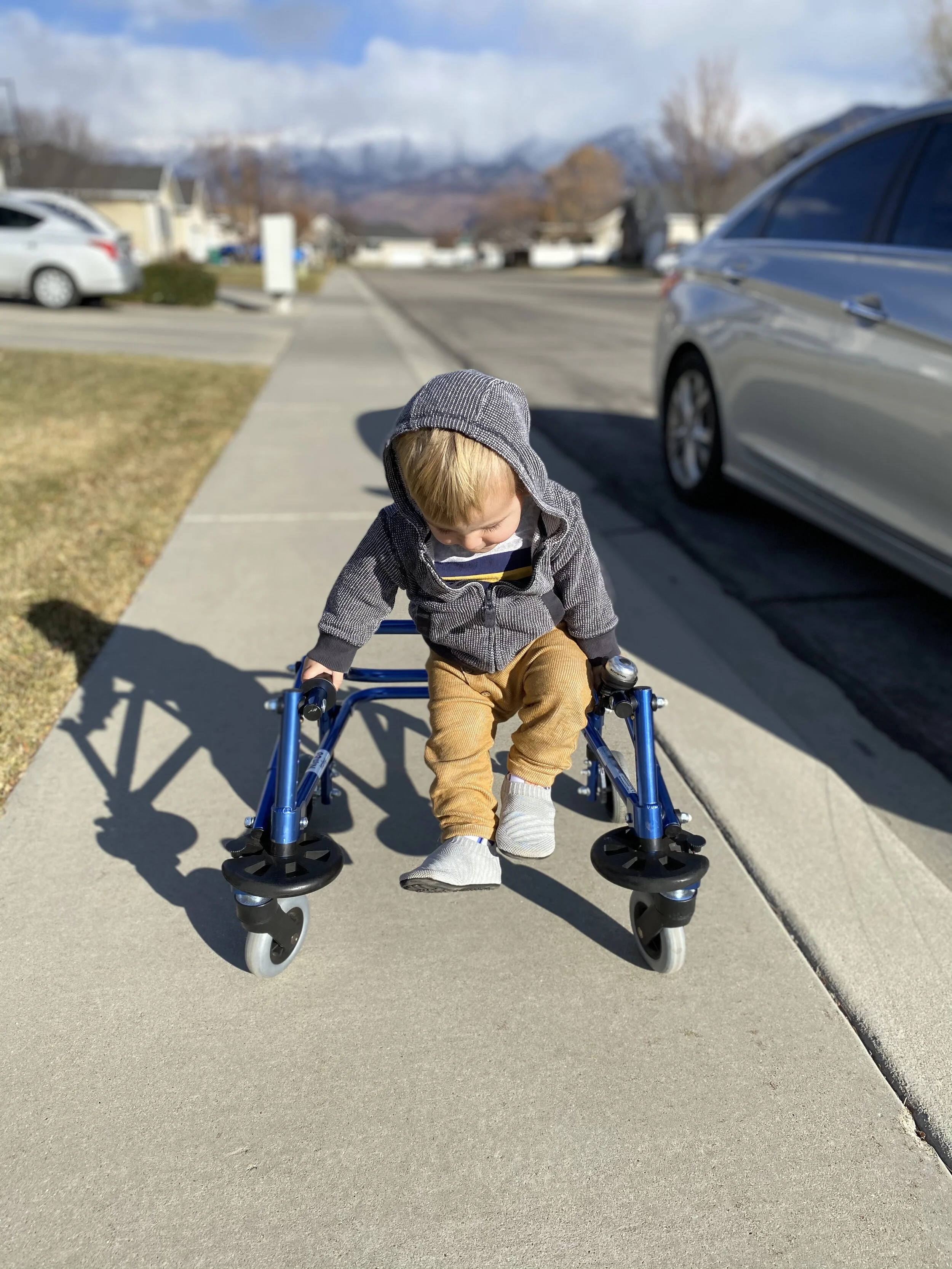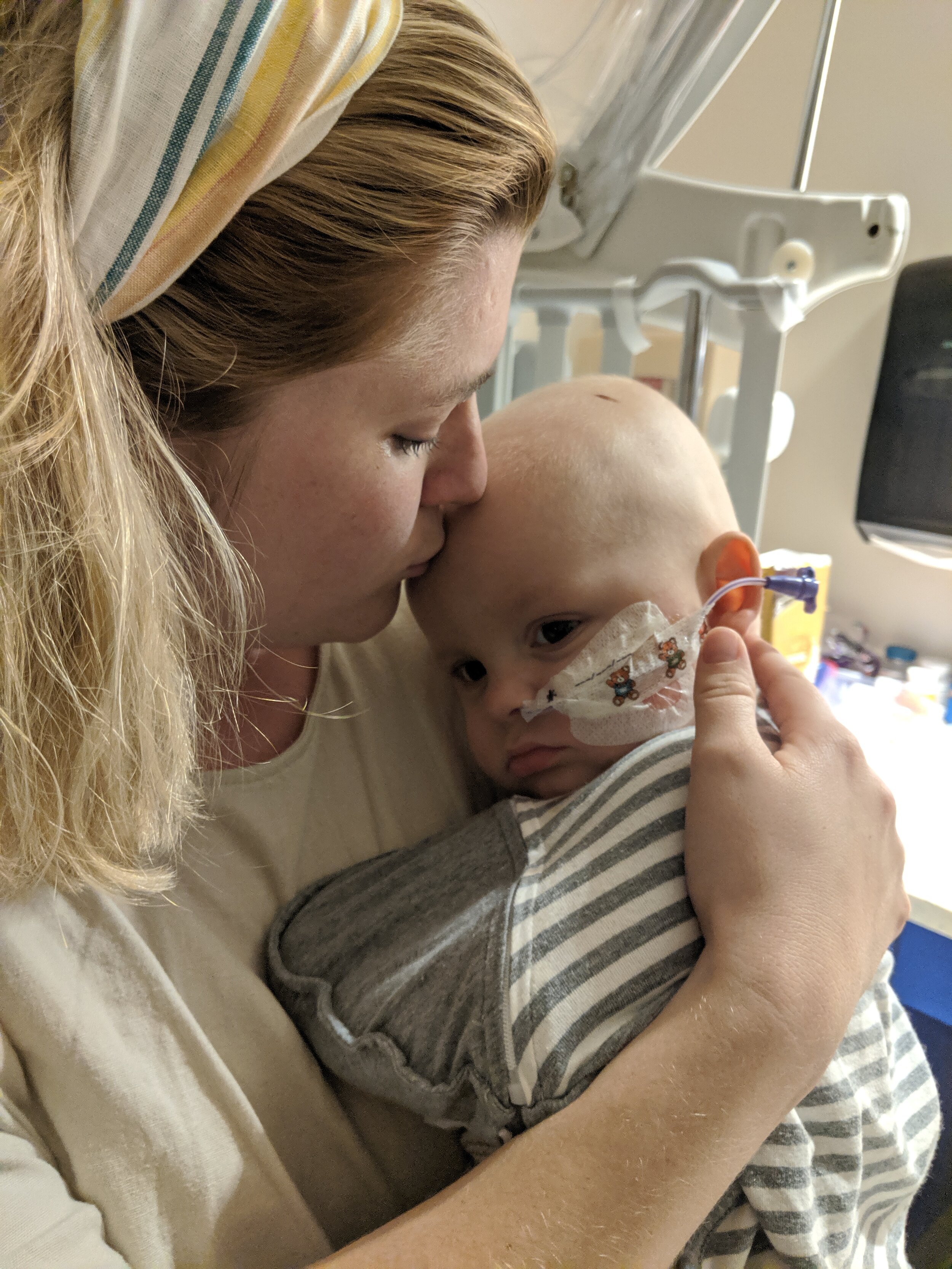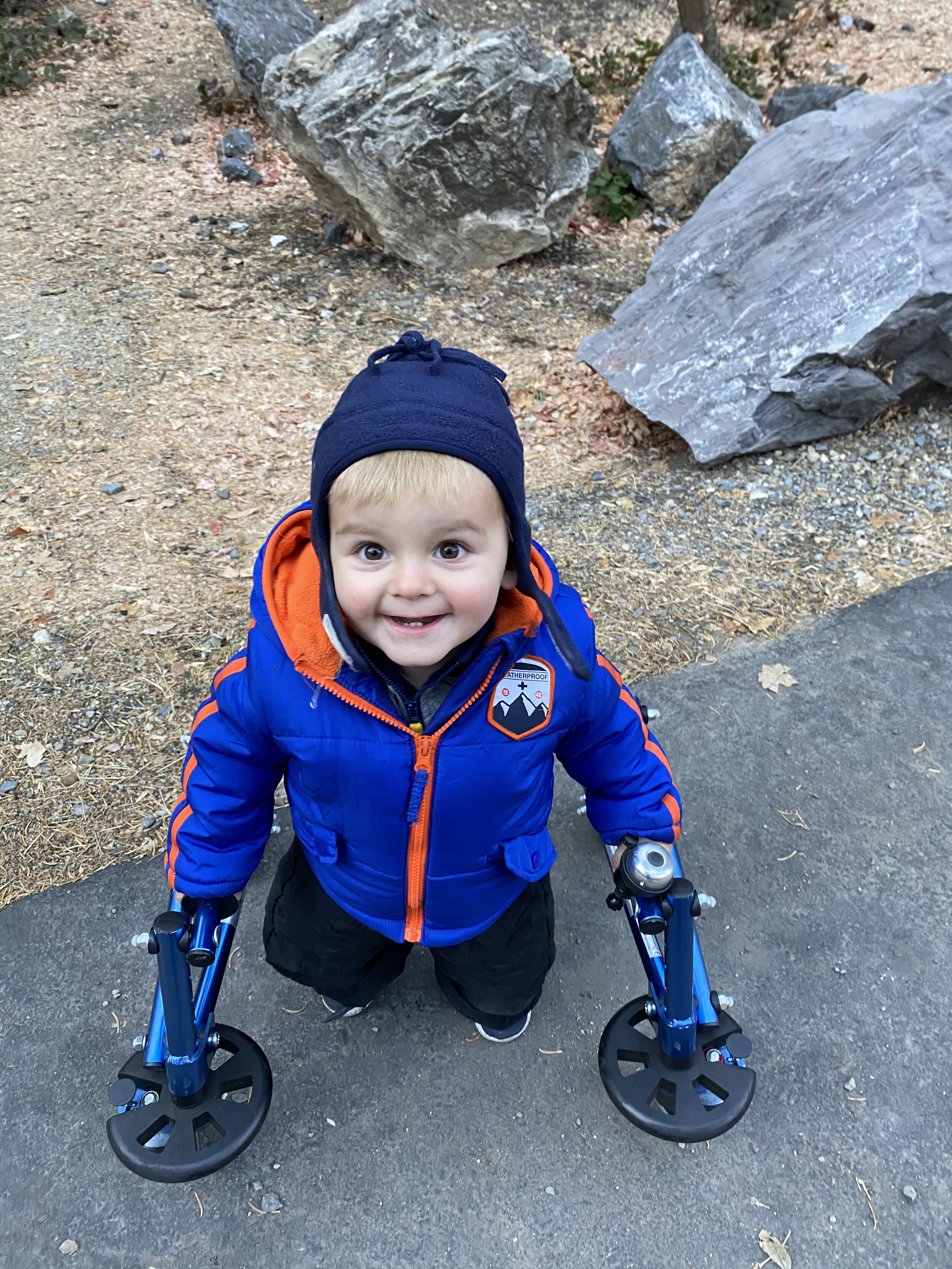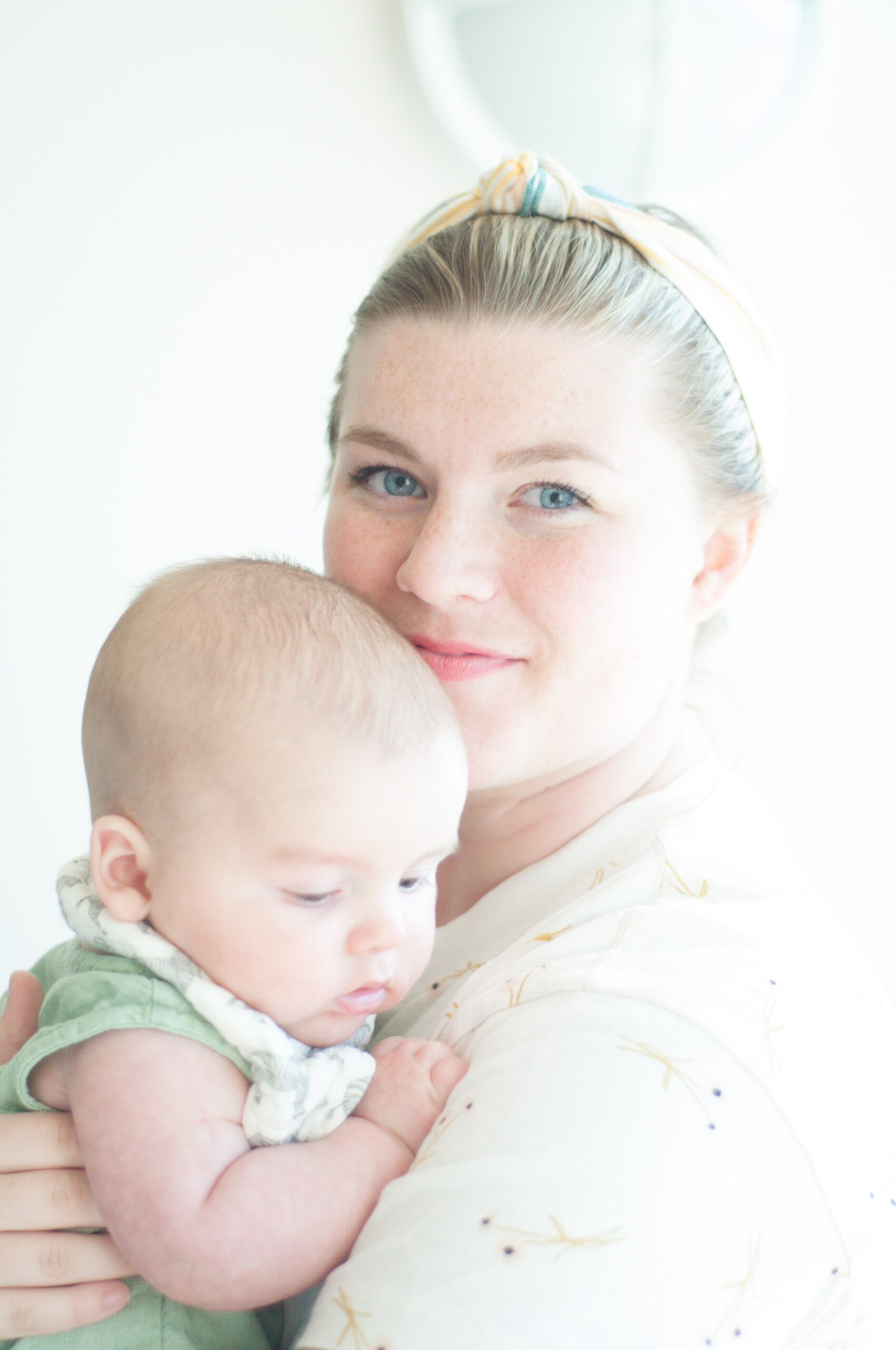Grieving My Child’s Disability
By Guest Blogger, Shelby Brimley
Some children get bruised easily or have excessive weight loss. Some have visible lumps, unexplainable pain, constant tiredness, or persistent nausea as their first sign of cancer. Charlie had paralysis.
At eight weeks old, my newborn baby boy stopped kicking.
Our pediatrician examined Charlie, bicycling his legs and testing for reflexes. Stroking the bottom of Charlie’s feet should have activated the Babinski reflex, the toes instinctively curling outward. Charlie's toes remained motionless. His stepping reflex had also disappeared. When the doctor held Charlie in an upright position, Charlie’s legs didn’t make any motions to place his feet on the ground or step forward. They simply hung.
A few hours later, we were in the ER where we discovered a large tumor compressing Charlie’s spinal cord, causing partial paralysis.
When we got the diagnosis—primitive myxoid mesenchymal tumor of infancy—we were told there were only six reported cases worldwide.
To say battling cancer was difficult, would be a gross understatement. Battling a rare cancer with no established treatment course, was even more challenging. But, in addition to the hardships of watching my baby go through surgery, chemotherapy, and radiation; I grieved the loss of Charlie’s leg function.
Cancer might be curable, I would think to myself, but paralysis… I didn’t know if Charlie would ever regain function of his lower body. If he did heal, I knew it would never be a full recovery.
Charlie was a baby during his cancer treatments, so it was normal that he couldn’t walk, yet. Sometimes, I would forget about his disability entirely. But often during that first year, I felt confronted by his paralysis at odd times, when I wasn’t expecting it.
The abnormal limpness of his lower body allowed Charlie amazing flexibility that took some getting used to. People often exclaimed surprise when they saw him perform the splits in every direction, pancake himself forward without his pelvis leaving the ground, or sit on his crotch with his legs in the shape of a Z, one tucked in front of him and one tucked behind him.
When I held Charlie against my hip, I noticed he couldn’t activate his hip adductors to cling to me. My arm cradled him under his bottom in order to keep him from slipping down my leg.
Often, my days were spent freeing Charlie’s legs after they got stuck under the couch, or straining to adjust his lower body to get him out of his high chair without his legs catching and scraping along the thigh holds.
Changing his diaper also presented challenges. Normal muscle tone allows a baby’s body to spring backward like a boomerang when their legs are being lifted, making it easier to wipe them. With low muscle tone, Charlie’s bum wouldn’t lift off the surface naturally when his legs were pushed against. I would grab both feet with one hand and use the strength of my arm to keep his bum above the floor while I wiped him with my free hand. Sometimes, after a large diaper or if my arm got too tired, I’d turn Charlie on his side so I could clean him without the strain of holding the dead weight of half his body off the ground.
One afternoon, when Charlie was eight months old, I decided to pass some time at our apartment’s outdoor swimming pool, sitting at the water’s edge with Charlie.
I removed my shoes and then Charlie’s, taking him to the entrance of the water to sit our feet on the steps. I put my hands on his legs, manipulating them to make kicking motions in the water. I hoped he might catch on and continue on his own, but he didn't. Not only did he not kick, he wouldn’t even look at his feet, as if he couldn't feel the cold and wet sensation on his skin.
In these moments, I felt pangs of sadness. If I could give Charlie my legs, I would, I bargained. It’s not fair, I cried. Will he be able to walk one day? Participate in P.E.? Go to school dances? Drive? I wondered.
Charlie is now one year into remission from cancer, and it has been almost two years since his spinal cord injury. His paralysis has improved significantly. Where before he could only flinch a toe or two, he can now use a posterior walker, and he can feel me tickle his feet, letting out the silliest toddler giggles.
Although many questions about his abilities and strength are undetermined, I find myself thinking less and less about his disability. Charlie’s paralysis has become a part of him just as any other trait of his is also a part of him—having similar weight and significance.
Charlie loves putting on Chapstick (both on himself and me).
Charlie skips the number seven when he counts to ten.
Charlie has a husky little voice.
Charlie loves playing Hot Wheels with his dad.
Charlie is partially paralyzed.
Be kind to yourself when grieving your child’s disability. I experienced (and sometimes still do experience) different stages of grief in regards to Charlie’s paralysis: denial, anger, bargaining, and depression. And as with many forms of grief, I’ve eventually experienced acceptance.
Last year, in the midst of battling cancer alongside my baby boy, I remember asking a friend who also had a young daughter battle cancer and a spinal cord injury, “Does it ever end?” Because I couldn’t imagine it ending. The stress, the sadness, the fear, the grief.
This year I feel differently. I feel peace and joy. I feel acceptance, even gratitude that Charlie is alive and happy. If you are in the midst of grieving a child’s disability, be patient with yourself. Peace did not come to me immediately, but eventually, it has, and the sacrifices I've made for my son has made my love for him more profound and even sweeter than I ever imagined.




